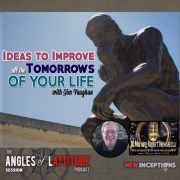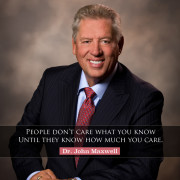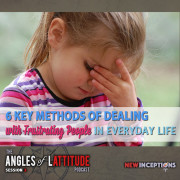How to Raise Your Standards
Great standards to strive for, right? Brendon always makes me think about things in a new light.
You know, we’re all trying to strive to higher levels. One of my all time most visited posts is this one I shared about 21 Standards that we can live and work by. However, since then, I’ve talked with a few readers who have thought that a person with all of those standards is someone who is completely unlike them.
They believe that they’re just too different. And those differences will prohibit them from ever reaching that level of success in their lives. They’ll never be like that expert… that ideal or model person. That person is just way too different.
They might even say, “I don’t trust them. They’re fake.” or “It’s easy for them to say, they don’t get where I’m coming from.”
And believe me, I can see where they’re coming from. In fact, I’ve been there. And what I found out is that there’s two parts in how you can raise your standards.
Add New Habits and Standards In (One by One)
This self limiting belief that “I’ll never be able to be successful” is one that I hear too often. Be the ideal person that they’re comparing themselves to is someone like Joe (the original author of those 21 standards) or another “ideal person”, they simply don’t see themselves being able to shed their old self. Again, I can relate. (I mean, as you guys know… I had a HUGE problem with having a positive attitude all the time. But in retrospect, it was a good exercise for me to have gone through.)
A person that has a life full of standards is one who has been working on making themselves better day after day. Each standard that they live by, they more than likely developed it separately from the others. They practiced it daily until it became automatic. Then they started working on another personal standard.
For example, when I first was in college, I simply didn’t make good grades. Part of this could have been the fact that my major was one of the hardest on campus. However, I think the problem was mainly the fact that I didn’t know how to study. And because I didn’t know how to study, my test taking was horrible as well. (Why should I know how to study? I was able to cruise through high school by simply fumbling around the test and getting by with B’s and A’s on my report card.)
I knew I was a good student. That I had it in me to get good grades. I just had to figure out how to play the game. I knew I had to raise my standards.
So when I realized that the material wasn’t the problem, but, instead, was the actual practices I used to “study” back then, it was certainly nice to know what the problem was. (My studying habits were “do the ones you know how to do and if you don’t know how to do them, then copy off of someone else.” This practice would soon almost get me kicked out!) Essentially I was looking at the problem as a whole and not breaking the questions down (as I’d later find out in my study group).
As I got better at studying, I got more comfortable with the material that was being taught in class. In fact, by the time I was in my second senior year (of 3), my test taking skills started going up as well. Why? Because I was no longer having anxiety during the test. I realized that most problems that I had were a matter of knowing a process to break them down. Prior to that point, I was constantly second guessing myself as to whether I really knew the answer or not before I even attempted breaking it down.
So when I finally knew the material and what the patterns were to solve the problems, I actually performed fairly well on tests after that. (I hope that relates to some of you who majored in a STEM field. If your major involved a ton of writing… I always did well by just writing down everything I knew and/or thought about a given subject and then linking them together.)
How does this apply here? The same strategy can be applied to other practices in life.
Let’s say you want to have better health. First, you need to start telling yourself that you are a healthy person. Do this regularly. Especially when you have cravings for a snack. Telling yourself this will help you from jumping off the wagon. You do this because your mind starts believing things the more it hears it. Next, change your diet. Once that becomes natural, then start getting more sleep. Then after that, try to exercise more. Do one for 30 days, then add the next for 30 days, and then add the next. After 90 days, you’ll have three healthy habits you’ll find hard to quit. Spoon feed yourself these new habits or you’ll choke and not accomplish any of it.
Limiting and/or Removing Old Standards and Habits
You probably wondered when this was going to happen. I mean, the last example I gave with being more healthy, you were probably thinking, “Well, if I add more sleep and exercise more, how am I supposed to keep on top of all my TV shows in the evening?” or something similar. There are only so many hours in a day, right?
This is true. However, let’s think about two contrasting thoughts here.
- You don’t have to be an exact replica of that model person you’re aiming to have similar qualities with. Just because you’re trying to be healthier, doesn’t mean you have to cut out all of your unhealthy habits. You can still binge on sweets, TV, video games, etc. (Just not like you used to…)
- As you change more and more and come closer to that model person that you want to be similar to (but not exactly like), you’re going to make more and more comparisons (micro-comparisons, even?) in what you do with your time and effort vs what they do with their time and effort. It’s natural as we grow as a human. In fact, you probably won’t notice the transformation as it doesn’t come over night. But if you keep a journal and/or analyze the thoughts you have right now vs the thoughts you had before you started your journey to the new you, they’re going to be crazy different.
Essentially, one side of you wants to remain YOU. The other side wants to change just enough to get their results.
Here’s the deal with those two thoughts. One one side, I think it’s inherent that you’re going to want to keep doing some of the things that you believe make you, you. I mean, after all, you don’t want to be that like that know it all expert, right? They don’t seem real. You want to make the transformation on your own terms. I totally get that.
The other side of you is like “Uh, I really think we need to be better at drinking water. That know it all expert actually does that pretty well. You always see her with a bottle. I wonder how she trained herself to drink water all the time.” Eventually, what you might come to find out is that the reason you might not have trusted or disliked someone at first is because they made you feel highly uncomfortable at the beginning. They were too alien. They were too good to be true.
However, now that you’re closer to them in multiple ways, you see them not only as a teacher, you actually start thinking of them as a person. And you might even start seeing some of their faults. They’re not as perfect as you once thought they were.
When you hit this level. You’ll get a different perspective not only on them and their actions, but on your actions as well. Knowing that this person puts on their pants one leg at a time just like you, you’ll start realizing some of the sacrifices they’ve made to get as far as they have.
This is when you ask yourself, do I want to have the results they have? If the answer is yes, then you’ll make the sacrifices they have. If the answer is no, then you’ll keep those old parts of your life as you see fit.
And just so you know when it’s right to be an “expert” for other people. I personally believe that this is the point. When you have learned all that you can from that previous ideal or model person, have gotten some of your own results, and can understand their actions might contradict what you want your end goal to be… that’s when you’re now in the teacher’s seat.
Homework:
What’s one subject that you know quite a bit about now that at one point you were clueless about? Maybe you had no idea where to start when you first began? Perhaps you were afraid to start? Do you remember where and from whom you learned the knowledge you have now? Let us know below. You might even gain some new students!








